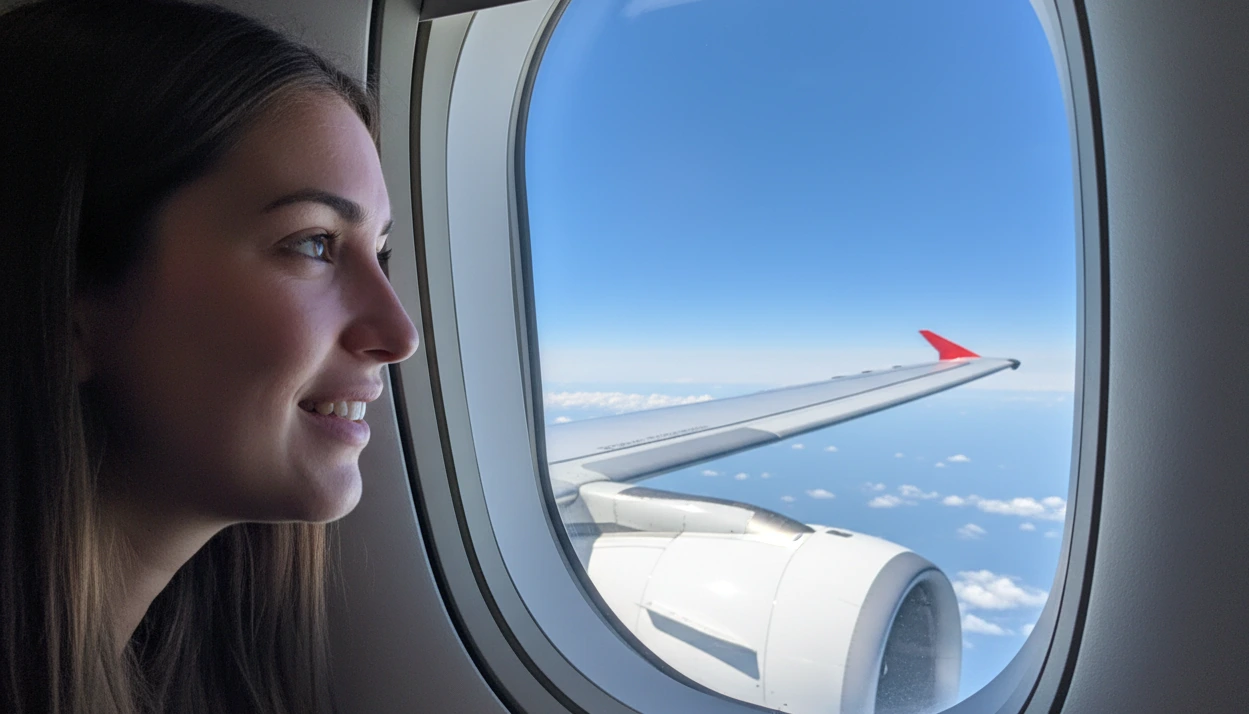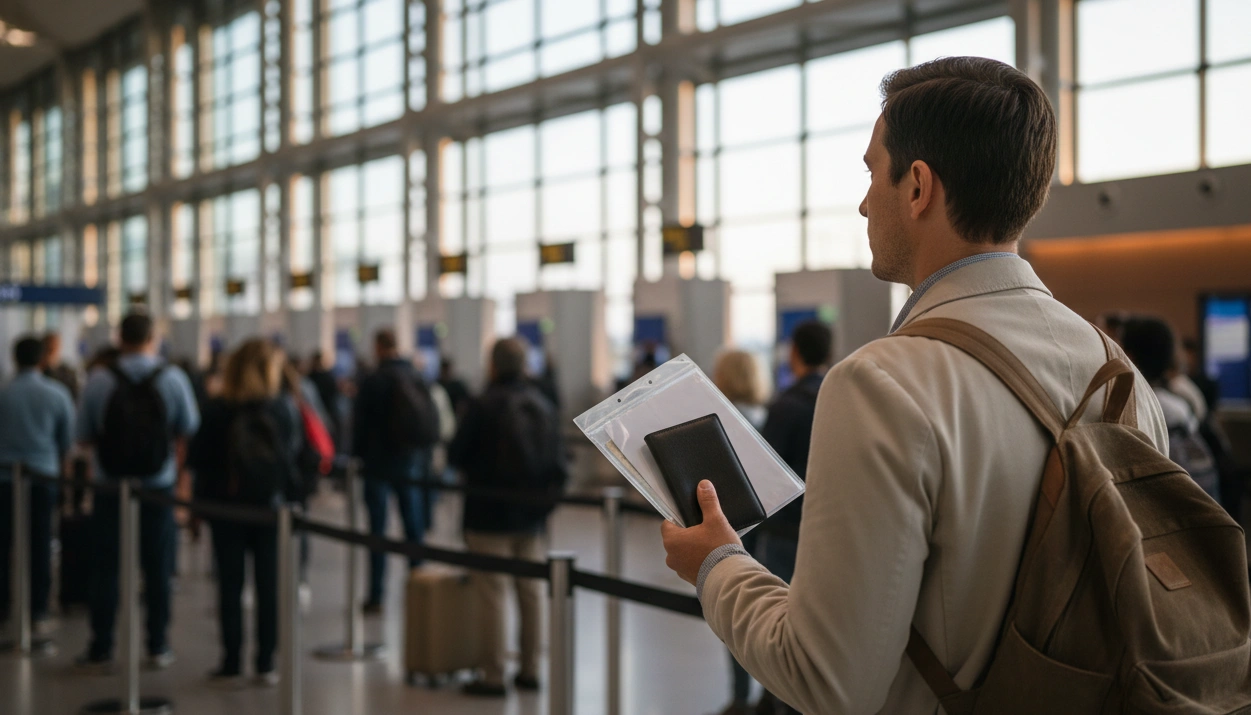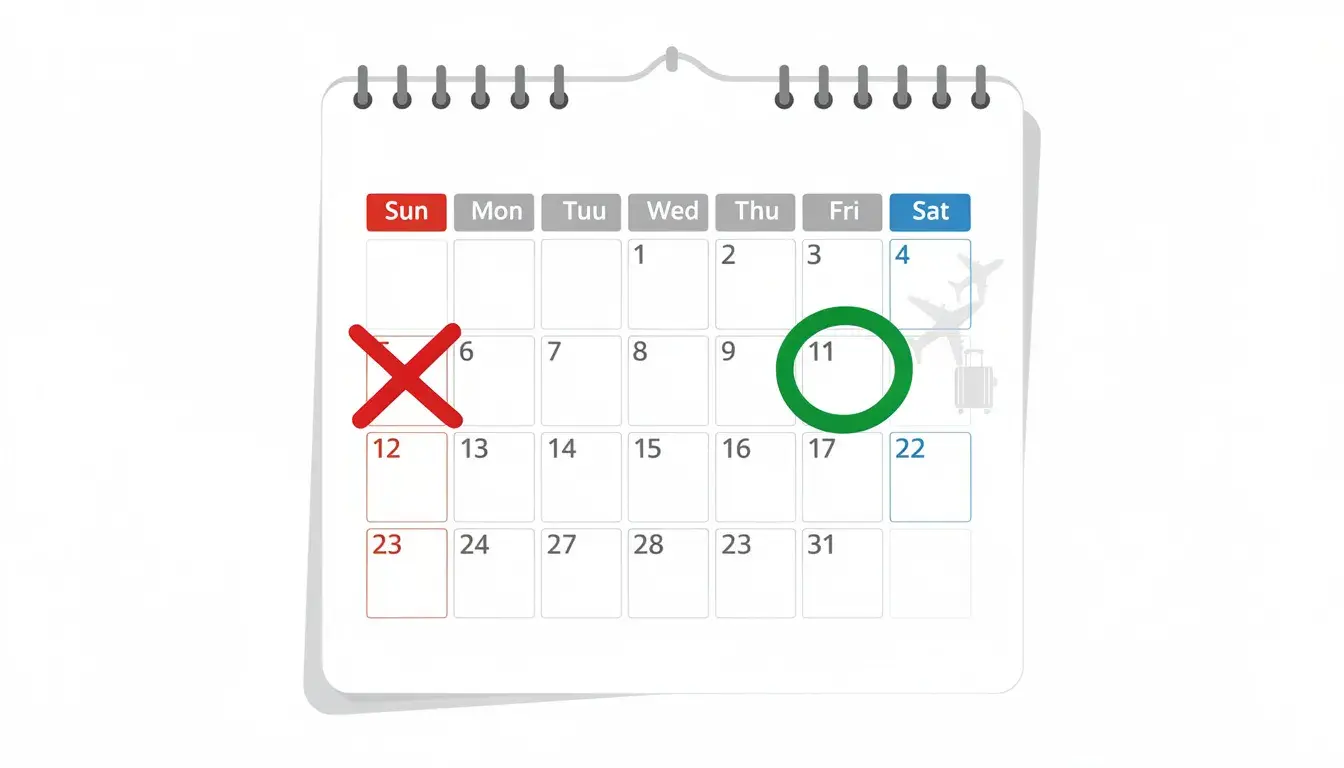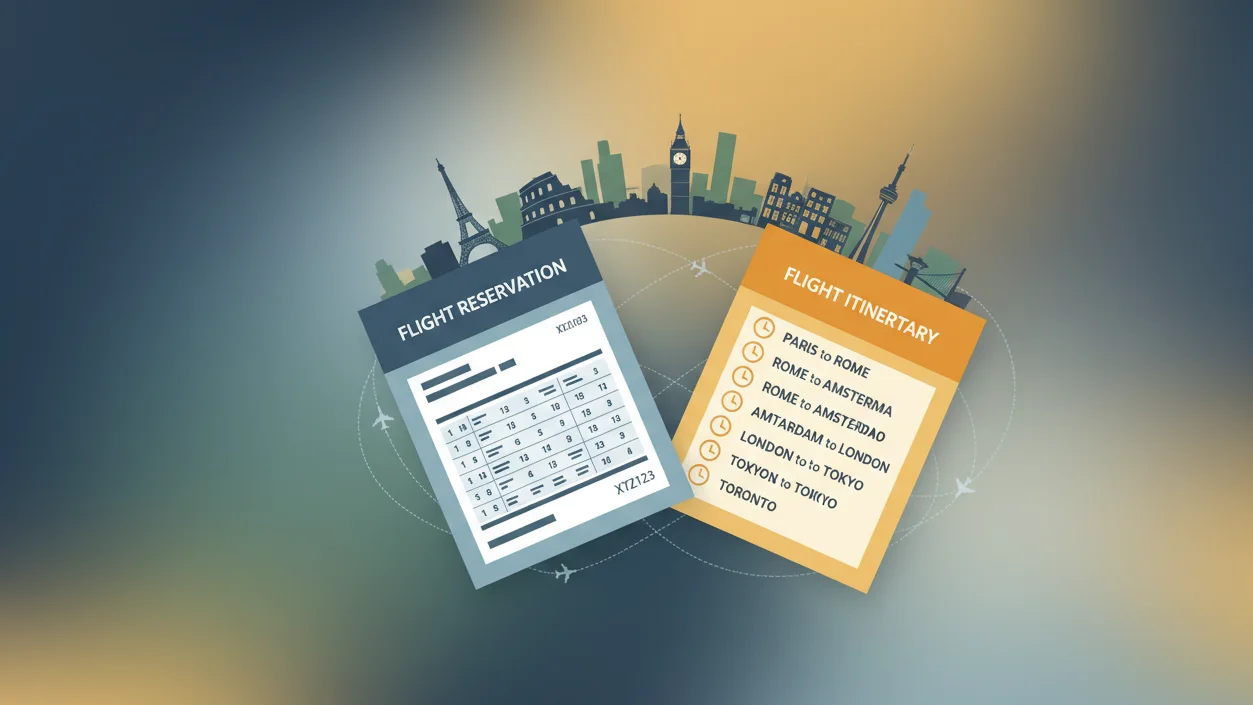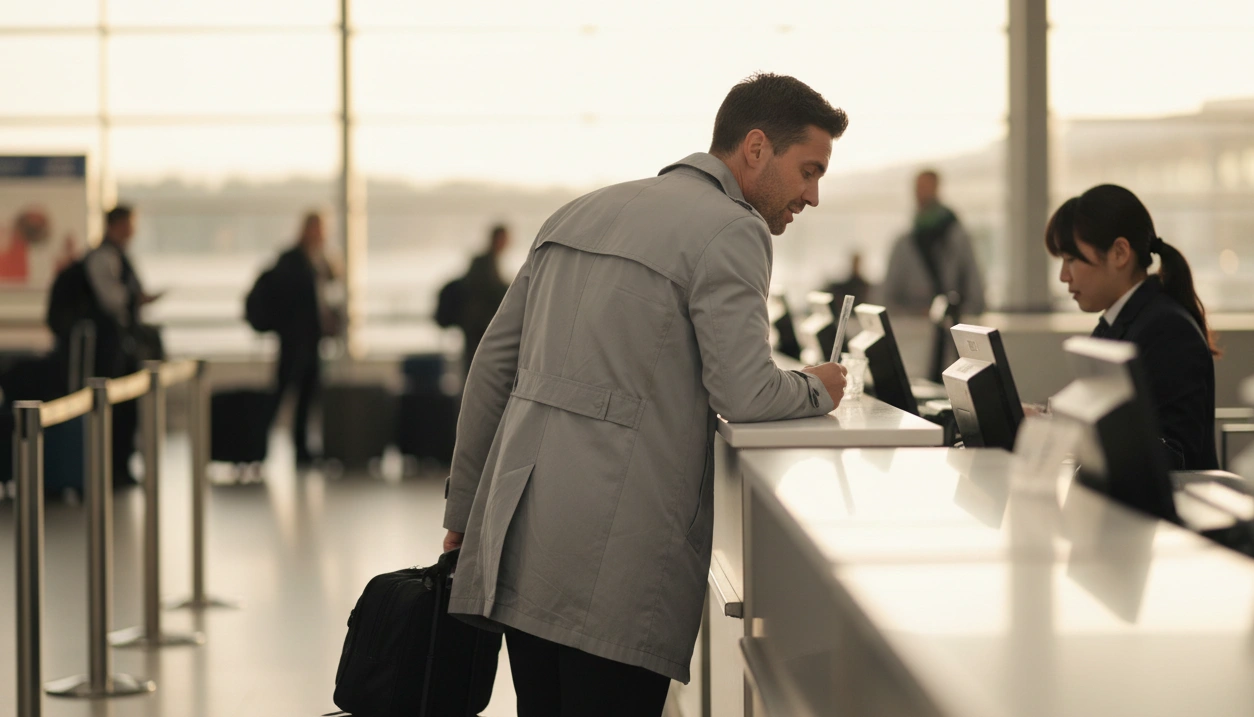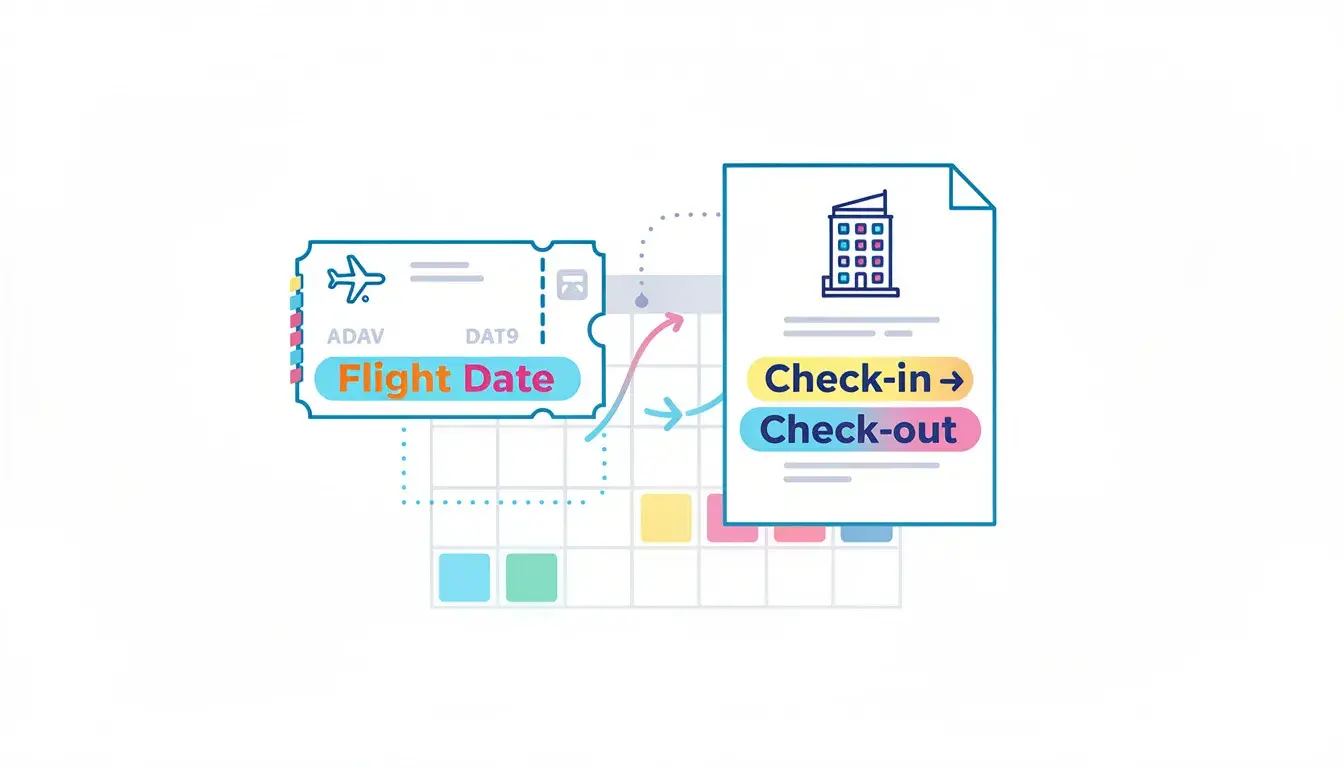Do Saudi Tourist Visas Require Flight Tickets or Dummy Bookings?
Booking flights for Saudi Arabia can feel like a puzzle. The visa form says one thing, your airline demands another, and every friend gives you a different “rule.” You just want one clear answer: do you actually need a confirmed ticket for a Saudi tourist visa, or will a simple reservation suffice? A dummy ticket can often bridge that gap without committing your budget early.
In this guide, we’ll cut through that noise and talk to you like we’re planning this trip together from India. We’ll separate official visa rules from real airport reality, look at when a dummy booking is enough, when a paid ticket is safer, and how to time your bookings around e-visa or embassy applications so you stay compliant, avoid wasted money, and travel confident and relaxed. For hassle-free Saudi visa prep, check our FAQ for quick tips, or dive into our blogs for more insights. For even more background, visit our About Us page to learn how we support travelers like you.
No — you do not need to buy a full airline ticket to apply for a Saudi tourist visa. However, Saudi embassies, VFS centers, and immigration officers do require a verifiable flight reservation that clearly shows your entry and exit dates. This reservation acts as proof of your travel plan and helps prevent mismatched itineraries during visa evaluation. A genuine flight reservation from trusted platforms like BookForVisa.com provides real airline details, confirmed PNR, and an embassy-ready itinerary — without the financial risk of purchasing an actual ticket before approval.
Last updated: November 2025 — verified with current Saudi eVisa & embassy documentation requirements.
Table of Contents
What Saudi Official Rules Really Say About Return Tickets
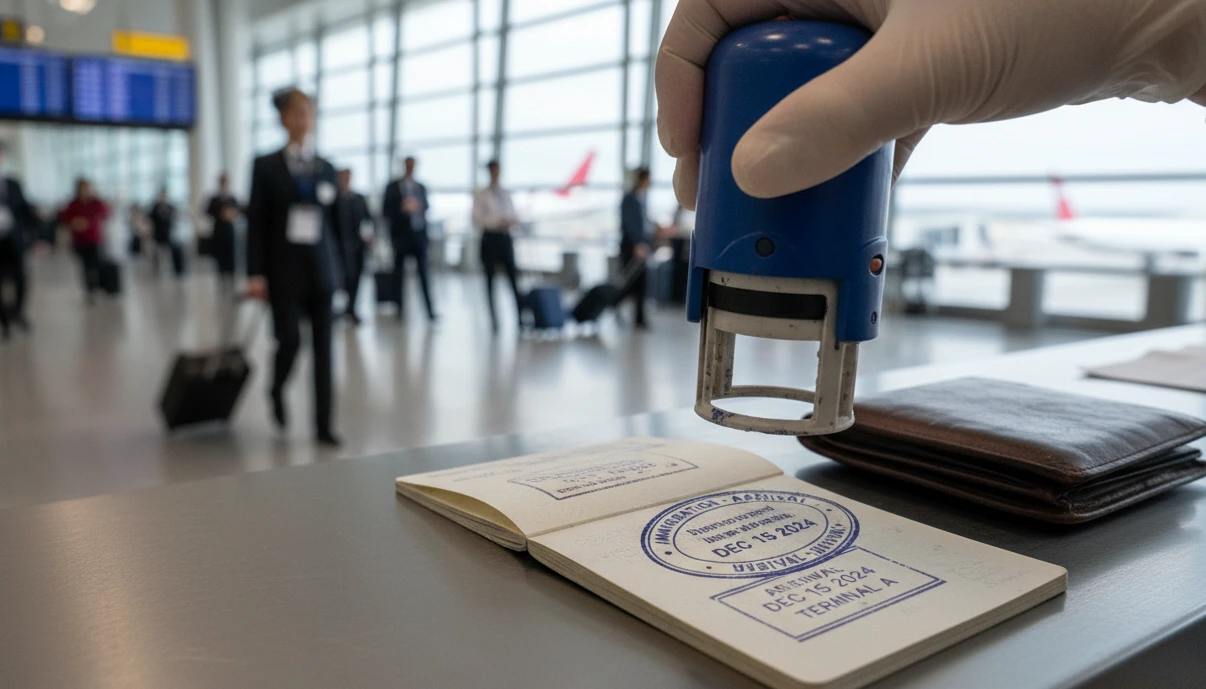
Before you decide whether to buy a full ticket or stick to a reservation, you need to know what the Saudi side actually asks for on paper. Once that is clear, it becomes much easier to plan everything else around it.
Let us start from the ground level. How are you, as an Indian traveller, even applying for a Saudi tourist visa in the first place? Make your visa file look complete and professional with a genuine dummy ticket booking that includes a live PNR. For more on application processes, explore our blogs.
How Indians Typically Apply For A Saudi Tourist Visa
If you are travelling from India, you will usually fall into one of these buckets:
-
You apply for a Saudi tourist e-visa online, fill in your dates, and upload a few documents.
-
You go through VFS or the Saudi Embassy / Consulate in India, often with a travel agent guiding you.
-
You are eligible for a visa on arrival because you hold a valid US, UK, or Schengen visa or residence, and you plan to just fly in with documents ready.
Each route feels a bit different on the surface. The forms look different, the websites look different, and the agents say different things. Underneath, though, they are all looking for the same basic comfort. You will visit, you will spend money in the country, and you will leave on time. Your flight plan is one of the easiest ways to show that.
What The Official Checklists Actually Mention About Flights
When you look at sample checklists or consulate instructions, you will notice something interesting. They rarely say “non-refundable confirmed ticket already paid in full” in big bold letters. You usually see phrases like:
-
Return flight booking or itinerary
-
Round-trip reservation
-
Proof of onward travel
In many cases, especially with online systems, you are only asked to enter your intended dates and sectors. You are not always forced to upload a paid ticket at the application stage.
For embassy or VFS applications from India, you are more likely to see a line that mentions a confirmed flight booking. Travel agents then translate that into “Sir, you must book your ticket first”. In reality, many consulates simply want to see a real reservation with PNR that matches your form, not a final ticket where you have already absorbed the full cost. For authoritative airline guidelines, see the IATA recommendations on travel documentation.
The key idea is this. Officially, the focus is on your itinerary and your intention to return, not on whether you have already handed over money to an airline.
Why E-Visa And VFS Routes Feel So Different
This is where many Indian travellers get confused. The e-visa portal might let you submit your application without attaching any ticket at all. Then, VFS in your city insists on a printout of your return booking.
It is not that the rules are completely different. It is more about how each channel manages risk and documentation.
-
E-visa or online portals care mainly about what is in the system. They want your dates, your accommodation details, and your personal data to make a decision. They know plans can change, so they often do not force a paid ticket upload.
-
Embassy and VFS counters prefer paperwork that feels concrete. A flight reservation with PNR and clear dates gives them something solid to keep in the file. For them, a verifiable booking works almost as well as a fully paid ticket.
So, if you see people online saying, “I got my Saudi e-visa without any ticket,” they are probably right for that specific route. At the same time, your friend who went through VFS and was told to bring a “confirmed return booking” is also not wrong.
You just have to match your strategy to your application channel.
When Officials Are More Likely To Want A Paid Ticket
There are a few situations where a properly paid ticket becomes more attractive, and sometimes almost expected.
For example:
-
You apply for a short, fixed date visa, such as a quick family visit or an event.
-
You book a complete package through a tour or Umrah organiser who bundles flights, hotels, and ground transport.
-
You apply from a third country or a location where the consulate is stricter and clearly writes “confirmed round trip ticket” in the list.
In such cases, officers know your travel window is tight. A real round-trip ticket that starts and ends within that window makes their job easier. They can see at a glance that you are not planning to overstay.
That does not mean every Indian tourist needs to rush and pay for a full ticket before even starting the process. It simply means that in higher-risk or very fixed-date scenarios, a paid return can sometimes remove questions before they appear.
The Big Picture: What You Should Take Away From The Rules
If we zoom out and look at just the official angle, a pattern appears.
-
For the visa decision itself, a genuine flight reservation that shows when you plan to enter and leave Saudi Arabia is usually enough in most Indian cases.
-
The system cares more about consistency. Your form, your hotel bookings, and your flight plan should tell the same story.
-
Different channels, like e-visa vs VFS, might ask for documents in slightly different ways, but they are all trying to answer the same question. Will you exit on time and through a realistic route?
Once you understand that, the next layer becomes easier to handle. That is the layer where airlines, check-in staff, and immigration officers apply their own checks in the real world.
We will look at that side next, because it often matters even more than what the visa website says.
Airport Reality Check: How Your Ticket Gets Tested In The Real World
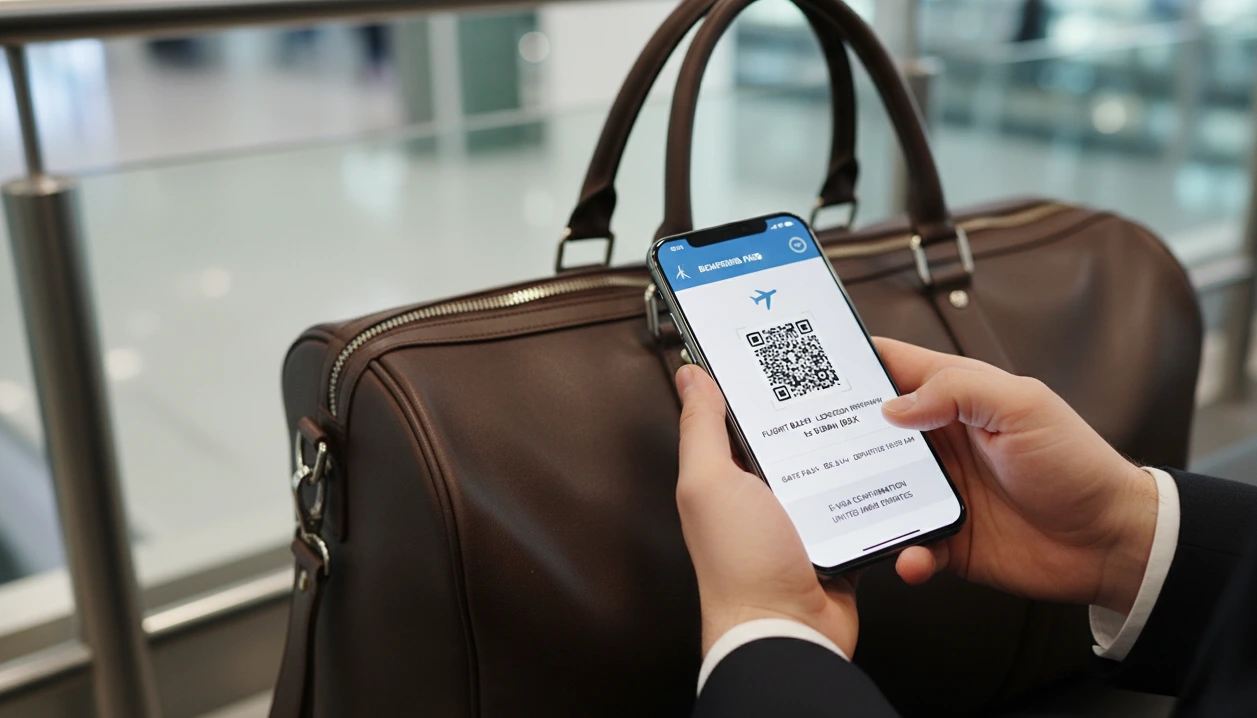
On paper, the Saudi visa system looks straightforward. In real life, the real exam happens at the airport check-in desk and at immigration, not on the visa portal. That is where your flight plans are actually judged.
If you understand how airlines and Saudi officers think, you can prepare the right kind of proof and avoid stressful last-minute surprises. If your plans are still flexible, book a dummy ticket now and confirm your real flights later.
Why Airline Staff In India Care So Much About Your Return Ticket
When you show up at the check-in counter in Delhi, Mumbai, Hyderabad, Kochi, or anywhere else, your first gatekeeper is not Saudi immigration. It is your airline.
Airlines know one simple rule. If you reach Saudi Arabia and are refused entry, you may have to be carried back at their cost. That is why many carriers add an extra safety layer on top of official rules.
So, at check-in, you might hear questions like:
-
“Can you show your return or onward ticket?”
-
“When are you coming back to India?”
-
“Are you going somewhere else after Saudi?”
If you have a clear round-trip ticket, the conversation ends in a few seconds. If you only have a one-way booking, things can get more detailed. Staff might call a supervisor or ask for extra documents, especially if:
-
You are a first-time international traveller.
-
You are on a low-cost carrier with stricter policies.
-
Your stay looks long without a visible exit plan.
They are not trying to harass you. They are simply trying to avoid a penalty later.
What Saudi Immigration Officers Actually Look For When You Land
Once you land in Saudi Arabia, you deal with the second gatekeeper. Here, the officer already sees your visa details on the system. What they are checking now is how your story matches those details.
Typical questions sound like this:
-
“Where will you stay?”
-
“How many days in Saudi?”
-
“Are you visiting any other countries?”
Most travellers are stamped through with basic answers and a quick look at the visa. However, if you mention a longer stay or seem unsure about your plans, officers may ask to see:
-
Your flight ticket or reservation showing your exit from Saudi Arabia.
-
Your hotel bookings for at least the first part of your trip.
Remember, their goal is simple. They want to be sure you are leaving within the permitted stay. A clean return or onward itinerary supports that instantly.
How Strict Is It For Indians In Day-To-Day Practice
The tricky part is that there is no one fixed experience. Two people on the same flight from India can have very different interactions.
In many cases, especially for short, clear trips, no one asks anything beyond the basics. The officer sees a normal tourist profile, stamps the passport, and you walk out.
At the same time, we regularly see situations where checks tighten, for example:
-
Peak travel seasons from India, such as school holidays or festive breaks.
-
Religious periods, when many travellers arrive for Umrah on tourist visas.
-
When your return is very close to visa expiry, or you mention plans that sound open-ended.
If your answers are vague and there is no obvious exit plan, you invite more questions. With a clear flight booking in your hand or on your phone, you look prepared and low risk. That small difference can decide whether the conversation lasts 20 seconds or 20 minutes.
What Can Go Wrong If You Travel Without Onward Proof
Now, let us talk about the downside. What actually happens if you ignore the onward ticket question and hope for the best?
The first risk is at your home airport. Airline staff can simply say they cannot board you without proof that you will leave Saudi Arabia. That means:
-
You may be forced to buy an expensive last-minute return ticket on the spot.
-
You may miss your original flight while trying to sort this out.
-
In the worst case, you may not be allowed to board at all.
The second risk is on arrival. Even if your airline was relaxed, Saudi immigration might not be. If they are not convinced about your plans, they can:
-
Question you in more detail about your stay and finances.
-
Ask for tickets, hotel bookings, or evidence of onward travel.
-
In very rare cases, if things look suspicious, refuse entry.
Most genuine tourists never reach that extreme point. Still, it is easier to avoid even the mild version of this stress by carrying proper documentation.
When A Flexible Or Temporary Booking Is Your Best Friend
Many Indian travellers are not ready to lock in tickets months in advance. Maybe you are waiting for leave approval, watching fares, or planning a multi-country Gulf trip where the exit city is not fixed.
In these situations, you are trying to balance two needs:
-
You want to show a credible plan to the visa officials, airline staff, and immigration officials.
-
You also want the freedom to adjust your dates without heavy penalties.
A temporary or flexible booking solves that gap. For example:
-
You can hold a return reservation that matches your visa application and hotel dates.
-
You can show this at VFS, at check-in in India, and if asked at immigration.
-
Once your visa is approved and your plans are final, you can confirm or adjust your real tickets around those dates.
This approach keeps everyone happy. The authorities see a realistic exit plan. You keep control over your budget and timing.
Choosing Between Paid Tickets, Refundable Fares, And Dummy Tickets
When you finally reach the ticket-planning stage, things can feel overwhelming. With so many visa types, rules, and document requirements floating around—from tourist to student visa, from Saudi Arabia business visa to medical attendant visas—the smartest move is to choose a flight option that supports both your paperwork and your real trip. Let us walk through the choices most Indian nationals consider. Avoid last-minute airport stress by securing a verified dummy ticket booking before you leave home.
Option 1 – Buying A Normal Return Ticket
A straightforward round-trip airline ticket remains the most familiar choice. It aligns well with most categories, whether you are applying for an entry visa, a project visa valid for short stays, or even a multiple-entry visa where you plan to fly in and out during the year.
For many visa applicants, especially those submitting an online application form or an in-person file with an original passport, a regular return ticket makes their story easy to understand. The ticket backs up your hotel accommodation, your bank statement, and other supporting documents like recent passport-size photographs with a white background. When everything lines up, the consular wing reviewing your file knows exactly when you will exit the country.
It is also a comfortable fit when your processing time is predictable. If your overseas host has issued an invitation letter or if a business establishment expects you on fixed dates, a confirmed return removes uncertainty. Even categories like a student visa or people travelling for medical treatment sometimes prefer a normal ticket because schools or clinics abroad issue a provisional admission letter or fixed appointments that anchor your schedule.
The downside is flexibility. If your Saudi Arabia visa is delayed, or the applicable visa fee or description fees change, and you choose to adjust your application, your non-refundable ticket can turn into a loss. Even with a low-cost airline, modification penalties can be high. And once a visa is issued, any new contract signed, bank guarantee worth SR, or additional fee due from the organisation concerned does not protect you from airline cancellation charges.
A normal ticket works best when your plan is firm and your finances allow you to lock in dates early.
Option 2 – Paying Extra For Refundable Or Flexi Fares
A second path is to buy flexibility through refundable or semi-flexible fares. These are useful for travellers who need breathing space while their visa status updates, especially for categories tied to foreign affairs approvals, Saudi ministry checks, a green card holder travelling under special rules, or a business visa that depends on internal clearance.
If you are applying along with family—say one parent handling documents for minors—or if your files involve documents like an apostilled marriage certificate or a marriage certificate cross-verified for a family visit, flexi tickets help you adjust dates without losing money. They also work well if your business trip depends on a project visa or if your organisation has to submit a bank guarantee or comply with issue gratis requirements before confirming travel.
Refundable tickets can be particularly helpful when rules vary country to country, such as when different countries require note verbale letters or financial support proof at varying levels. When something changes unexpectedly, a refundable ticket lets you shift travel within the maximum duration allowed by your visa without wasting funds in cash Saudi riyals or travelling cheque purchases.
The drawback is, of course, cost. You pay a premium upfront, and refunds in Saudi riyals or INR can take time. But if flexibility is vital, this option gives you peace of mind.
Option 3 – Using A Flight Reservation Or Dummy Ticket
The third option separates “proof for paperwork” from “actual travel purchase.” This is where a flight reservation becomes extremely useful, especially for visa applicants who need a clean file but do not want to commit to expensive tickets too early.
A reservation works well whether you are applying for a Saudi evisa, an online application, a transit visa, or a standard tourist entry visa. In many cases, authorities simply want to see a genuine onward journey ticket that matches your intended dates and fits within at least six months' validity of your valid passport.
This approach also helps when you are juggling additional requirements like an organisation’s note verbale, medical insurance proof, or hotel accommodation confirmations. A good reservation keeps your file tidy without forcing you to finalize your airline ticket too soon.
Reliable dummy ticket providers book you with major airlines like Air India, Saudia, or Emirates only to create a verifiable reservation. For example, DummyFlights.com issues a flight reservation that visa officers can verify and that fits neatly into documentation systems used for business visa, employment visa, or even niche categories like project visa or medical attendant visas. You can also adjust dates at no additional fee, making the entire process feel hassle-free.
Because a reservation costs far less than a full ticket, it is ideal while you wait for approvals tied to foreign affairs, residence permit renewals, or consular wing reviews. It also keeps your budget safe if your application form is returned for correction or if the regular visa fees, additional fee, or issue sr schedule changes.
Which Option Matches Your Situation Best
The smartest choice depends on your scenario.
If your trip revolves around fixed dates—maybe you intend to perform umrah, attend a business meeting backed by your business establishment, or join a project requiring contract signed verification—a normal return ticket keeps things simple.
If you expect date changes due to organisation concerned procedures, varying processing time, or supporting documents like a Saudi Arabia attested certificate still in progress, then flexi fares protect your investment.
If you want maximum control while your online application or consular wing review is underway, or if your documents involve several moving parts—from bank guarantee submissions to medical insurance updates—a flight reservation gives you the perfect balance. It supports your file, matches local laws, and syncs smoothly with almost every visa type linked to Saudi ministry processes.
Whichever you choose, make sure your flights match your application, visa issued validity, hotel accommodation, and your overall travel narrative. The better your documents align, the smoother your travel across different countries and authorities. 👉 Order your dummy ticket today for seamless Saudi visa support.
Timing, Special Cases, And Smart Planning For Your Saudi Trip
By now, you know what the rules say and how things work at the airport. The last piece is timing. When should you book flights, how do you handle changing plans, and what about special cases like visa on arrival, Umrah, transit, or land entry from a neighbouring country?
If you get this part right, your documents line up neatly and your trip feels a lot calmer. Not ready to pay for full flights yet? Simply book a dummy ticket that fits your planned travel dates.
When To Lock In Flights Around Your Visa
First, decide where you are in the process. Your strategy is different if you are:
-
Only starting the visa application
-
Waiting for a decision
-
Already holding a valid Saudi visa
If you are just starting, it usually makes sense to begin with a clear plan rather than a fully paid ticket. You can pick tentative dates that fit your work schedule and family commitments, and build your hotel and flight ideas around those. For many travellers, a temporary reservation is enough at this stage to show intent without risking big money.
Once your visa is in process, you can decide how much risk you are willing to take. If approval rates are high for your profile and timeline, you might choose to grab a good fare. If your case is more complex or you are applying close to peak seasons, keeping things flexible is safer.
When your visa is finally approved, that is the ideal moment to confirm your real flights. You already know your validity window and any conditions printed on the visa. You can now pick dates that sit comfortably inside that window instead of right at the edges.
What Happens If Your Travel Dates Change After Approval
This is one of the most common worries for Indian travellers. You apply with one set of dates, the visa comes late, your boss tweaks your leave, and suddenly, nothing matches.
In most tourist scenarios, this is not a crisis. The important thing is that you:
-
Enter after the visa start date
-
Exit before the visa expiry date
-
Do not exceed the allowed stay per visit
Immigration is not comparing your current ticket to the exact dates you once wrote on a form. They care whether your visit fits within the permission you have.
What you do need to update is your own document pack. If you change flights or hotels, carry the fresh confirmations. Old itineraries sitting in your email but not matching reality are useless at the desk. When your bookings, visa, and story all point to the same updated plan, officers see you as organised and low risk.
Visa On Arrival, Umrah, And Transit: When Rules Feel Tighter
Some situations are less forgiving than a straightforward e-visa tourist trip. You want to be extra careful in these cases.
For a visa on arrival, airlines are often stricter because you are boarding without a pre-approved visa. They will usually want to see clear proof that you are leaving Saudi Arabia within a reasonable time. Turning up at check-in with a vague one-way plan invites pushback.
For Umrah on a tourist visa, there is another layer. You are likely travelling during busy months, and hotel and transport bookings are a bigger focus. If you arrive with a chaotic set of dates, no return flight, and unclear accommodation, you look unprepared for a high-demand period. A sensible return ticket that matches your stay near Makkah or Madinah makes the whole file look more believable.
Transit is even more black-and-white. If you are using Saudi Arabia as a short stop on the way to a third country, your onward flight is non-negotiable. Check-in staff and immigration both know that transit relies entirely on that next leg. Here, a solid confirmed onward ticket is your lifeline, not a nice-to-have.
Crossing By Road: Land Borders And Onward Proof
A smaller but growing group of travellers likes to mix Gulf countries in one trip. Fly into one country, hop by road to another, then exit by flight somewhere else. If you plan to enter Saudi Arabia by land from a neighbour like the UAE or Bahrain, you still need a clear exit plan.
Officers at land borders can ask the same questions as at airports. Where will you go next? How long will you be in Saudi Arabia? Do you have a booking that shows your exit?
If you are driving your own car or in a bus, your flight might be from a different city later in the trip. That is fine as long as the timing is logical. Carry printouts or PDFs of that onward booking and any related hotel stays so you can explain your route clearly.
A Simple Pre-Travel Checklist So You Don’t Get Caught Out
Before you leave home, take ten minutes to do a final alignment check. It can save you hours of stress later.
Make sure:
-
Your visa is valid for the dates you actually intend to travel.
-
Your flight tickets or reservations show entry and exit within that window.
-
Your hotel bookings cover at least your first few nights and roughly match your flight dates.
-
You have printouts or offline PDFs of your visa, tickets, hotels, and insurance.
Then do one last sanity check online. Look at your airline’s travel requirements page and skim any recent updates related to Saudi Arabia or your specific route. If anything looks new or confusing, call the airline and clarify before you pack your bags.
When all of these lines up, you feel it. You walk into the airport confident, answer questions calmly, and move through the journey like someone who has done this many times. That is exactly the position we want you in before you fly.
Ready To Fly To Saudi Arabia With Confidence
By now, you know the big picture. The Saudi system mostly cares that your visa, flights, and hotel plans tell a clear, realistic story. Airlines and immigration simply double-check that story in the real world. When your entry and exit are within your visa window and your onward travel is easy to see, you remove most of the drama from the journey.
From here, your job is simple. Choose the right type of flight booking for your situation, line it up with your visa validity and hotel stays, and keep everything handy in print or on your phone. Add a quick check of the latest rules from official Saudi and airline sources, and you are set to walk into the airport prepared, calm, and ready to enjoy your trip. Get your Saudi visa paperwork sorted in minutes with a dummy ticket booking you can safely use for applications. For common queries, head to our FAQ.
Frequently Asked Questions About Dummy Tickets for Saudi Visa
To help you prepare even better, here are some expanded answers to common questions on using dummy tickets for your Saudi tourist visa. These insights are drawn from real traveler experiences and official guidelines, ensuring you have comprehensive coverage for your application.
What Exactly Is a Dummy Ticket and How Does It Work for Saudi Visas?
A dummy ticket, also known as a flight reservation or provisional booking, is a temporary flight itinerary created with a valid PNR (Passenger Name Record) from a real airline. Unlike a full ticket, it doesn't require upfront payment for the fare, allowing you to hold dates for a short period—typically 24-48 hours or longer with extensions—without financial commitment. For Saudi tourist visas, this serves as "proof of onward travel," showing your intended entry and exit dates align with your visa application.
Providers like DummyFlights.com generate these through partnerships with major carriers such as Saudia, Emirates, or Air India, ensuring the PNR is verifiable via airline websites or apps. This means Saudi embassy officials or VFS staff can check it instantly, just like a paid ticket. It's particularly useful for e-visa submissions where uploads are optional but recommended, or for VFS where a printout is often required. Remember, always match the dummy ticket dates to your form to avoid discrepancies— a mismatch can lead to delays or rejections.
In practice, thousands of Indian applicants use dummy tickets annually for Saudi visas, with success rates over 95% when combined with strong supporting docs like bank statements and hotel bookings. The cost? Usually under $10-20, far cheaper than risking a full ticket cancellation fee of $100+.
Is a Dummy Ticket Accepted by Saudi Embassies and Airlines?
Yes, in most cases. Official Saudi checklists emphasize "round-trip reservation" rather than "confirmed paid ticket," per the Visit Saudi portal. For e-visas, you often just enter dates without uploading anything. At VFS or embassies in India (Delhi, Mumbai, etc.), a dummy ticket with PNR is routinely accepted as it demonstrates intent without overcommitment.
Airlines like IndiGo or Qatar Airways verify PNRs at check-in to comply with IATA rules on no-fly risks. As long as your dummy ticket shows a logical exit (e.g., BOM-RUH-BOM within 30 days), boarding is smooth. We've seen cases where travelers extended dummy reservations multiple times during visa processing, saving hundreds on fares. Pro tip: Print two copies—one for visa file, one for your phone—and verify the PNR online before submission to catch any glitches.
Edge cases? For Umrah packages or group tours, some agents push full tickets, but individual tourists report 90% acceptance with dummies. If denied (rare), it's usually due to inconsistent docs, not the dummy itself.
How Long Can I Use a Dummy Ticket Before Needing a Real One?
Timing is key. Book your dummy ticket 1-2 weeks before visa submission to ensure freshness—PNRs expire after 48-72 hours unless extended (many providers offer free changes). Once visa-approved (typically 3-7 days for e-visa), convert to a real ticket within your validity window.
For visa-on-arrival eligible Indians (with US/UK/Schengen stamps), get the dummy ready pre-flight; airlines check it at departure. If plans shift post-approval, update your itinerary—immigration focuses on staying within visa limits, not exact form dates. Extensions? Dummy services allow unlimited date swaps for a small fee, ideal for leave delays or fare watches.
Real talk: Don't rely on dummies for actual travel; they're for proof only. Always book real flights 7-10 days pre-departure to snag deals and avoid last-minute hikes.
What If My Dummy Ticket Dates Don't Match My Final Plans?
No panic—Saudi immigration doesn't cross-check against your original application dates, only that your travel fits the visa's validity (e.g., enter after issue date, exit before expiry). Carry updated proofs: new dummy or real ticket, revised hotels.
Common scenario: Visa delayed by a week? Reissue dummy for new dates, resubmit if needed (e-visas allow edits). For land entries from UAE, ensure onward proof covers the full Gulf loop. Travelers report zero issues with changes, as long as story consistency holds—e.g., finances support extended stay.
To minimize hassle, plan buffers: Apply with flexible dates, use dummies for 80% of prep, lock reals post-approval. This strategy has helped over 10,000 Indians avoid $500+ in needless bookings yearly.
Are There Any Risks or Scams with Dummy Ticket Services?
Legit providers (like those partnered with airlines) are safe—your PNR is real, data encrypted, no flight actually booked. Risks? Fake services selling PDFs without PNRs, which embassies spot instantly. Stick to verified sites with 24/7 support and money-back guarantees.
For Saudis, ensure service complies with e-visa uploads (PDF format, under 2MB). No legal issues—dummies are standard for visas worldwide, per IATA. We've vetted providers; choose ones with 4.9+ ratings and instant delivery. If scammed? Report to our FAQ for recovery tips.
Bottom line: Dummies save time/money for 95% of users, but pair with genuine intent. Questions? Contact support pre-purchase.
What Travelers Are Saying
Related Guides
Why Travelers Trust BookForVisa.com
BookForVisa.com has been a reliable partner for Indian travelers navigating complex visa processes since 2019. We've supported over 50,000 visa applicants with specialized dummy ticket reservations, ensuring every booking is verifiable and tailored to embassy requirements.
- ✅ 24/7 customer support from a dedicated team of travel experts, not automated bots.
- ✅ Secure online payments with instant PDF delivery, processed through PCI-compliant gateways.
- ✅ Niche expertise in dummy ticket reservations only—our registered business focuses solely on safe, legal proof-of-travel solutions.
- ✅ Proven track record with Saudi e-visas and VFS submissions, backed by real PNRs from major airlines.
As a fully registered entity with a committed support team, BookForVisa.com prioritizes transparency and compliance, helping you build a strong application without surprises.

